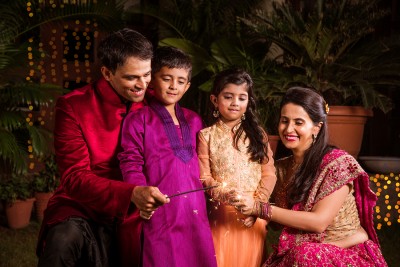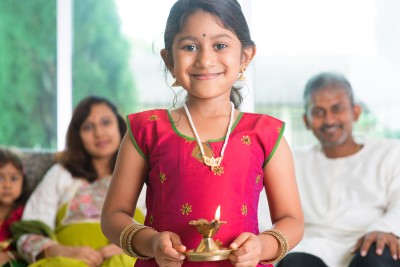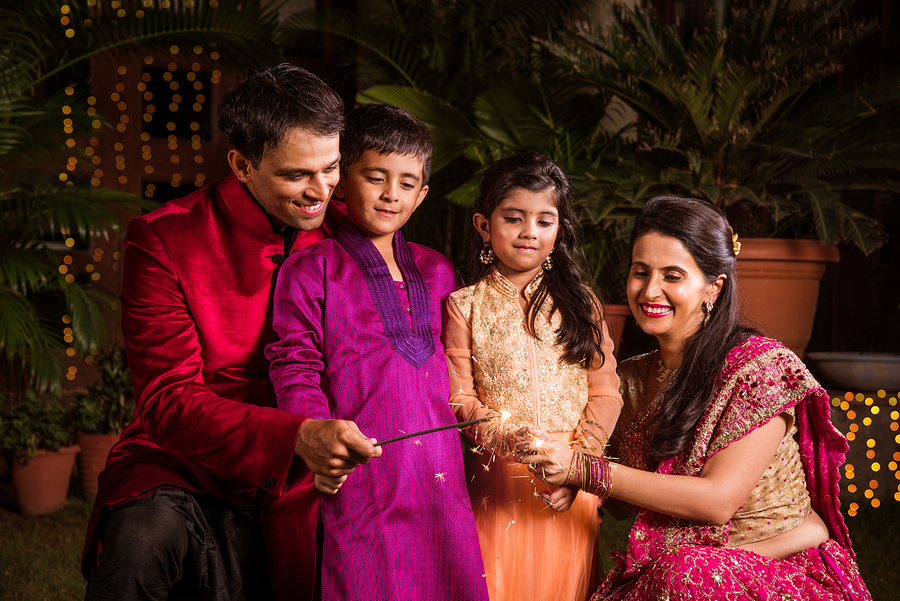By Roma Khetarpal

Parenting Contributor, Roma Khetarpal
My daughter was five years old when she started questioning the rituals that her Grandma followed daily and diligently in our home.
Why do we have to take our shoes off before we come into the temple room?
Why do you light the candle every day? What does a candle mean?
Why do we offer a coconut on Diwali?
Why are we vegetarian on Mondays and Tuesdays?
If you’re praying for the family, then how come I don’t understand what you’re saying? What’s this funny mantra language?
The questions went on and on. At first they were directed toward Grandma, but when she started to get the universal answer—“Because we are Hindus”—which wasn’t good enough for her, guess where she turned? Yes, to Mom! The honest-to-goodness truth is that I didn’t have many of the answers. Often, I would be left scratching my head, thinking, “That’s a great question! Why do we do that? How come I haven’t asked?”
This is a common dilemma for those of us with a South Asian heritage. Our cultural and religious beliefs are attached to tons of rituals. If we shove them down our children’s throats, they will run away. If we do away with them ourselves, we are dimming the richness that these traditions offer. So what should parents do?
- Entertain and explore every curiosity with an open mind and heart. No matter what the question, be prepared to invest time and effort in exploring it. Today we have the Internet at our fingertips. Use this resource wisely. With the overdose of information available, use trusted resources. Reach out to grandparents, community elders, or spiritual leaders.
To find answers to my daughter’s questions, my cousin in India recommended a beautiful book by the Chinmaya Mission called Why Do We. It listed all the reasons behind the Hindu rituals of lighting a candle, offering a coconut, lighting incense, and so on. I went as far as ordering 100 of these books from India and distributing them to parents at our annual Diwali party. When I explored the answers, I better understood them and was able to advocate the practices to my daughter. So if you want to keep the rituals and traditions, find the value, meaning, message, and beauty behind them yourself first. 
- Open up to discussions, no matter how uncomfortable. The key is to do so without dumping guilt on children. When my mum-in-law told my daughter that we are vegetarian on Mondays and Tuesdays because these are holy days, my daughter asked, “Is that a holiday?” “No, it’s not,” grandma said, “but good Hindus don’t eat meat on Mondays and Tuesdays.” “Is my friend Hema a bad Hindu then?” my daughter went on. “Why just Mondays and Tuesdays? If vegetarian is a good thing for a good Hindu on Monday and Tuesday, why can’t we just be good Hindus every day? Who picked these two days?” She went on and on because the answers didn’t make sense to her. So make sure what you are telling your children makes sense to you first. In parenting, being a role model is as important as being a rule model.
- Evaluate family rituals. Consider whether these still align with your current belief system or are outdated. If the ritual or tradition does not make sense to you, the likelihood of your following it consistently will be small, which means that your kids will not be connected to it either. Rituals take time and effort. Pass on those that will make the time and effort seem valuable and enjoyable.

- Let go of what doesn’t serve you anymore. This is a big one. Don’t be mired in guilt and doubt, when letting go of what does not serve you or your family any more. Letting go is hard to do and will definitely open you up for comments from a parent, in-law, family member, or a South Asian friend. But there is no other way to help our children find value in what we are exposing them to. What you do decide to keep and pass on to the next generation should be meaningful to you and to them. Think of all the rituals that your parents had and may still have. I’m sure you are not following half of them!
- Update family rituals every few years. Take an inventory of family rituals periodically. As we grow and change, some rituals and traditions might need reviewing and updating. When my son moved back home after graduating from college, he had done away with vegetarian Mondays and Tuesdays. So when he would whip up an omelet for breakfast on those mornings, my mum-in-law complained no end. She felt it violated her principles and blamed us for having none. When my son got wind of this—directly from her—he started eating breakfast out on those days. He would swing by some fast-food restaurant to get his protein. I got serious and told my mum-in-law that we needed to shift things around to accommodate him. After all it was his home as much as ours, and he should be able to cook as he pleased. It made no sense for us to push him out, when the organic food we had at home was better than anything he’d get outside. It took a little convincing but she came around—reluctantly.

My son, on the other hand, showed his appreciation for her open-mindedness by actually observing a vegetarian day on Tuesday. When I asked him what brought that about, he said, “I want to respect Dadi’s (Grandma’s) principles, too. Besides being vegetarian on Tuesdays will be a good way for me to practice some self-discipline. It’s a win-win, Mom. Isn’t this what family is all about? It should work for every one.”
In the end, if we don’t push something down our children’s throats, they will come to their own conclusions and beliefs. They might end up embracing rituals simply out of respect or dropping them. What’s important is having them find meaning and connection to the rituals through personal experience and independent decision making.
We are the first parental generation to attach the words “conscious,” “mindful,” or “aware” to the way we parent our children. It is our responsibility and our obligation to pay the same type of attention to the rituals we follow at home and advocate to our next generation. Otherwise, we risk losing the richness and beauty that our cultures and traditions have to offer.



There are no comments
Add yours